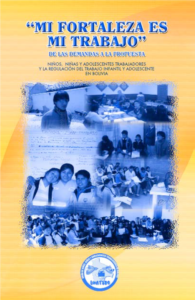Minds of the Movement
An ICNC blog on the people and power of civil resistance
by Amy SchmidtMarch 08, 2018
“The place doesn’t matter. Nor the food, nor the rain. What matters is that we have made ourselves heard. The revolution doesn’t happen in 5-star hotels with buffets of food and it doesn’t happen in the springtime when everything is beautiful. It happens in the moments of crisis,” said 15-year old Alfredo Turqui about demonstrations in La Paz, Bolivia. In December of 2013, Alfredo and his compañeros, all under age 18, marched, shouted in ‘voz alta’, maintained vigil in the rain, and abstained from eating until they convened in the evening at the Alojamiento Imperial, a hotel with nightly rates of 10 Bolivianos—about 1 dollar.
These young demonstrators traveled to La Paz from throughout Bolivia, hoping to be heard by their government, to express concerns about a newly proposed labor law. Their nonviolent resistance was met by police aggression—pepper spray and force, causing several young marchers to be hospitalized. Their voices were heard, word of police action spread, and as a result, they arranged to meet with senators, officials, and finally, President Evo Morales, who listened to their concerns, remembering his days herding llamas as a child.
History of Child Labor in Bolivia
The 2013 demonstration in La Paz is a notable part of this unique and ongoing movement in Bolivia. There are approximately 850,000 child laborers (workers under age 18) in Bolivia. Fifteen thousand are members of a national organization, the Union of Child Workers in Bolivia (UNATsBO), which is organized for children by children. They began organizing in 2000 and in 2003 they founded the union. They focus on education and labor and have written a manifesto addressing these two areas.
The UNATsBO manifesto asks the state to recognize and value the economic, social, and cultural contributions of their labor. It promotes labor rights, regardless of age, protection against abuse and exploitation, and guaranteed education and training aligning with their vocation, aptitude, and skills. The UNATsBO march in 2013 was in response to a code that would raise the legal working age to 14, which they believed would increase exploitation of workers under 14. Other efforts have focused on reform to the Bolivian education system, such as improved alternative education (night school) and a higher standard of education in general.
UNATsBO is represented by branches in cities across the country, each branch with its own name and officers who act as representatives at national meetings. Members are referred to as NATs (the Spanish acronym for Child and Adolescent Workers). Branch members choose their leaders, sometimes through a democratic election process and other times through direct appointment.
Tactics and Stakes
Juan David, current member and administrator of the UNATsBO Facebook page, speaks about tactics and success. He describes their principal tactics, which vary widely: “We hold meetings, debates, and events to raise awareness. We have different groups, different talents and different forms of work. We use music, art, theater and many other things. This is part of our culture and we see these as forms of expression.” He claims that what leads to success is consistency and constant participation, and what doesn’t work is force and denial.
Child workers often come from poor families and face discrimination in school by teachers and classmates, as well as on the streets. UNATsBO does more than just fight for their rights and protection. Membership offers them visibility in their communities, support from peers, and a place to learn leadership, confidence, and organizing skills. Former member, Gladys says, “It has an incredible effect on the life of each child because you break the mold and you leave aside the idea of the ‘poor child who suffers’. You realize that you have a lot of capacity and ability, that you form part of this society and contribute.”
As a result of UNATsBO demonstrations in 2013, where young marchers withstood rain, police aggression, hunger and poor accommodations, Vice President Alvaro Garcia signed a bill into law lowering the legal working age to 10. While this was considered a success by UNATsBO, the international response was less than positive. Human Rights Watch (New York) suggested that Bolivia should instead invest in ways to lift families out of poverty and the ILO mentioned the UN convention about legal work age.
Much of this response focused on the working age itself and not the other protections offered by this law. Human Rights Watch says that people who work as children end up with less education and lower earnings as adults, leaving them more likely to send their children to work, and perpetuating the cycle of poverty. This may be true in general, but interestingly, Evo Morales was a child laborer before he went on to become president of the country. Of course, one example of success does not prove positive value of child labor. However, it does remind us that we cannot measure all of existence with the same size ruler. Suggesting that Bolivia ‘fix’ its poverty rather than allow children protections in the work place is an over-simplified suggestion to a complex social issue.
What is Progress?
Many say that while the rest of the world moves forward in relation to child labor, Bolivia is moving backward. But are they? Who determines in what direction forward progress moves? Is it possible that perhaps Bolivia, by listening to the voices of its children, is actually more progressive? Are Bolivia’s children safer because of these atypical labor laws? Or more vulnerable to the cycles of poverty? Perhaps it is too soon to say. What remains most interesting about this movement is that the children are defining reality in their own terms — a reality where they work hard and ask to be respected in doing so. They recognize their needs and ask their government to address those needs. For the moment, we may set aside the question of ‘rightness’ or ‘wrongness’ of child labor and find inspiration from children who are capable not only of hard work but also of effective organizing, strategy, resistance and wisdom.
“Los niños sueñan con un mundo donde juego, trabajo y estudio vayan juntos.” The children dream of a world where play, work and study go together.
--Manfred Liebel (adult ally of UNATsBO)
Did you know? ICNC's online Resource Library offers dozens of articles, book chapters, and other texts on civil resistance in Spanish. Click here to browse our titles.

Amy Schmidt
Amy is a writer, yoga teacher, activist and student. She most recently worked as the executive director of a nonprofit healthcare organization, before moving on to continue her education. She currently resides in Costa Rica, where she is enrolled in an MA program at the University for Peace.
Read More